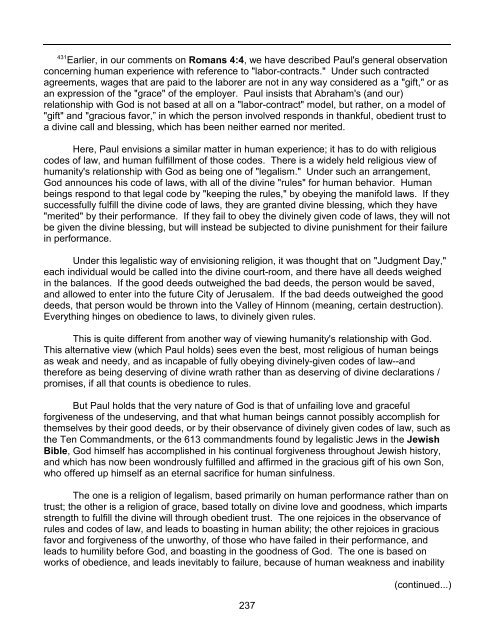Romans 4 - In Depth Bible Commentaries
Romans 4 - In Depth Bible Commentaries
Romans 4 - In Depth Bible Commentaries
Create successful ePaper yourself
Turn your PDF publications into a flip-book with our unique Google optimized e-Paper software.
431Earlier, in our comments on <strong>Romans</strong> 4:4, we have described Paul's general observationconcerning human experience with reference to "labor-contracts." Under such contractedagreements, wages that are paid to the laborer are not in any way considered as a "gift," or asan expression of the "grace" of the employer. Paul insists that Abraham's (and our)relationship with God is not based at all on a "labor-contract" model, but rather, on a model of"gift" and "gracious favor,” in which the person involved responds in thankful, obedient trust toa divine call and blessing, which has been neither earned nor merited.Here, Paul envisions a similar matter in human experience; it has to do with religiouscodes of law, and human fulfillment of those codes. There is a widely held religious view ofhumanity's relationship with God as being one of "legalism." Under such an arrangement,God announces his code of laws, with all of the divine "rules" for human behavior. Humanbeings respond to that legal code by "keeping the rules," by obeying the manifold laws. If theysuccessfully fulfill the divine code of laws, they are granted divine blessing, which they have"merited" by their performance. If they fail to obey the divinely given code of laws, they will notbe given the divine blessing, but will instead be subjected to divine punishment for their failurein performance.Under this legalistic way of envisioning religion, it was thought that on "Judgment Day,"each individual would be called into the divine court-room, and there have all deeds weighedin the balances. If the good deeds outweighed the bad deeds, the person would be saved,and allowed to enter into the future City of Jerusalem. If the bad deeds outweighed the gooddeeds, that person would be thrown into the Valley of Hinnom (meaning, certain destruction).Everything hinges on obedience to laws, to divinely given rules.This is quite different from another way of viewing humanity's relationship with God.This alternative view (which Paul holds) sees even the best, most religious of human beingsas weak and needy, and as incapable of fully obeying divinely-given codes of law--andtherefore as being deserving of divine wrath rather than as deserving of divine declarations /promises, if all that counts is obedience to rules.But Paul holds that the very nature of God is that of unfailing love and gracefulforgiveness of the undeserving, and that what human beings cannot possibly accomplish forthemselves by their good deeds, or by their observance of divinely given codes of law, such asthe Ten Commandments, or the 613 commandments found by legalistic Jews in the Jewish<strong>Bible</strong>, God himself has accomplished in his continual forgiveness throughout Jewish history,and which has now been wondrously fulfilled and affirmed in the gracious gift of his own Son,who offered up himself as an eternal sacrifice for human sinfulness.The one is a religion of legalism, based primarily on human performance rather than ontrust; the other is a religion of grace, based totally on divine love and goodness, which impartsstrength to fulfill the divine will through obedient trust. The one rejoices in the observance ofrules and codes of law, and leads to boasting in human ability; the other rejoices in graciousfavor and forgiveness of the unworthy, of those who have failed in their performance, andleads to humility before God, and boasting in the goodness of God. The one is based onworks of obedience, and leads inevitably to failure, because of human weakness and inability237(continued...)
















